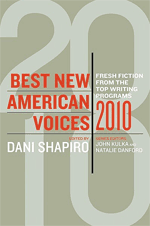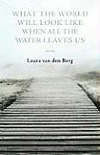
Best New American Voices

A particularly well-crafted story, “Up High in the Air,” comes from Laura van den Berg. Her first collection, What the World Will Look Like When All the Water Leaves Us, comes out this month from Dzanc Books and contains eight solid stories, all of which are inventive, cohesive, and memorable.
Only 26 years old and a graduate of Emerson’s MFA program, van den Berg’s collection feels particularly fresh. The collection is full of women who are relentlessly abandoned. Fathers go missing and husbands go mad. Though the stories in her collection take place around the globe, from Madagascar to Scotland to Brooklyn, the women belong nowhere. Their existence depends on a blind belief in the unseen—fidelity, mortality, monsters, madness. The stories can sometimes be beautifully messy, but the best ones are the simplest, recalling the alien sadness of Joy Williams and the sharp wit of Jean Thompson. In my favorite story, “Where We Must Be,” a divorced failed actress who takes a job in the woods as a Big Foot impersonator begins to date a dying man. In a manner both absurd and touching, the story peels back layers of fear and examines what it means to be a survivor, of cancer, of divorce, of imaginary monsters, of anything.

And she is just one promising voice in the anthology. Other contributors are equally impressive, and other anthologies are equally important. This year’s PEN/O. Henry Prize Stories featured Caitlin Horrocks’s fantastic “This Is Not Your City,” which illustrates a communication breakdown in a Russian-Finnish family. An alumna of Arizona State’s MFA program, Horrocks’s first collection is forthcoming next year from Sarabande. Best American Short Stories 2009 showcased really smart stories from young writers, two of my favorites being “The Farms,” by Eleanor Henderson, from the UVA MFA program (disclosure: she’s the chair of VQR’s fiction board), and “The Peripatetic Coffin,” by Ethan Rutherford, a rising star out of the University of Minnesota’s MFA program.
Maybe it’s true that most of the readers of literary fiction anthologies are writers who want to be in those anthologies. But the short story is the young writer’s first portal into the world of literary fiction, and without the anthologies to celebrate the form and encourage the endeavor, I don’t know where we would all be. In particular, the Best New American Voices series is a testament to the viability of the youthful perspectives coming out of MFA programs, annually making new what could become staid. If this year’s edition is indeed the last, then perhaps that story is the saddest of the year.
